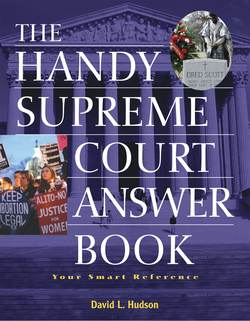Читать книгу The Handy Supreme Court Answer Book - David L Hudson - Страница 240
На сайте Литреса книга снята с продажи.
Who was the attorney for the city of Baltimore?
ОглавлениеRoger B. Taney represented the city of Baltimore in the Barron case. A few years later, Taney would succeed Marshall as chief justice of the U.S. Supreme Court.
CourtSpeak: Ogden v. Saunders Contract Clause and Bankruptcy Case (1827)
Justice Bushrod Washington (majority): “It is thus most apparent, that, which ever way we turn, whether to laws affecting the validity, construction, or discharges of contracts, or the evidence or remedy to be employed in enforcing them, we are met by this overruling and admitted distinction, between those which operate retrospectively, and those which operate prospectively. In all of them, the law is pronounced to be void in the first class of cases, and not so in the second.”
Justice William Johnson (majority): “The right, then, of the creditor, to the aid of the public arm for the recovery of contracts, is not absolute and unlimited, but may be modified by the necessities or policy of societies. And this, together with the contract itself, must be taken by the individual, subject to such restrictions and conditions as are imposed by the laws of the country. The right to pass bankrupt laws is asserted by every civilized nation in the world.”
Justice Smith Thompson (majority): “It is admitted, and has so been decided by this Court, that a State law, discharging insolvent debtors from their contracts, entered into antecedent to the passing of the law, falls within this clause in the constitution, and is void. In the case now before the Court, the contract was made subsequent to the passage of the law; and this, it is believed, forms a solid ground of distinction, whether tested by the letter, or the spirit and policy of the prohibition. It was not denied on the argument, and, I presume, cannot be, but that a law may be void in part and good in part; or, in other words, that it may be void, so far as it has a retrospective application to past contracts, and valid, as applied prospectively to future contracts.”
Justice Robert Trimble (majority): “As, in a state of nature, the natural obligation of a contract consists in the right and potential capacity of the individual to take, or enforce the delivery of the thing due to him by the contract, or its equivalent; so, in the social state, the obligation of a contract consists in the efficacy of the civil law, which attaches to the contract, and enforces its performance, or gives an equivalent in lieu of performance. From these principles it seems to result as a necessary corollary, that the obligation of a contract made within a sovereign State, must be precisely that allowed by the law of the State, and none other.”
Chief Justice John Marshall (dissenting): “If one law enters into all subsequent contracts, so does every other law which relates to the subject. A legislative act, then, declaring that all contracts should be subject to legislative control, and should be discharged as the legislature might prescribe, would become a component part of every contract, and be one of its conditions.”
